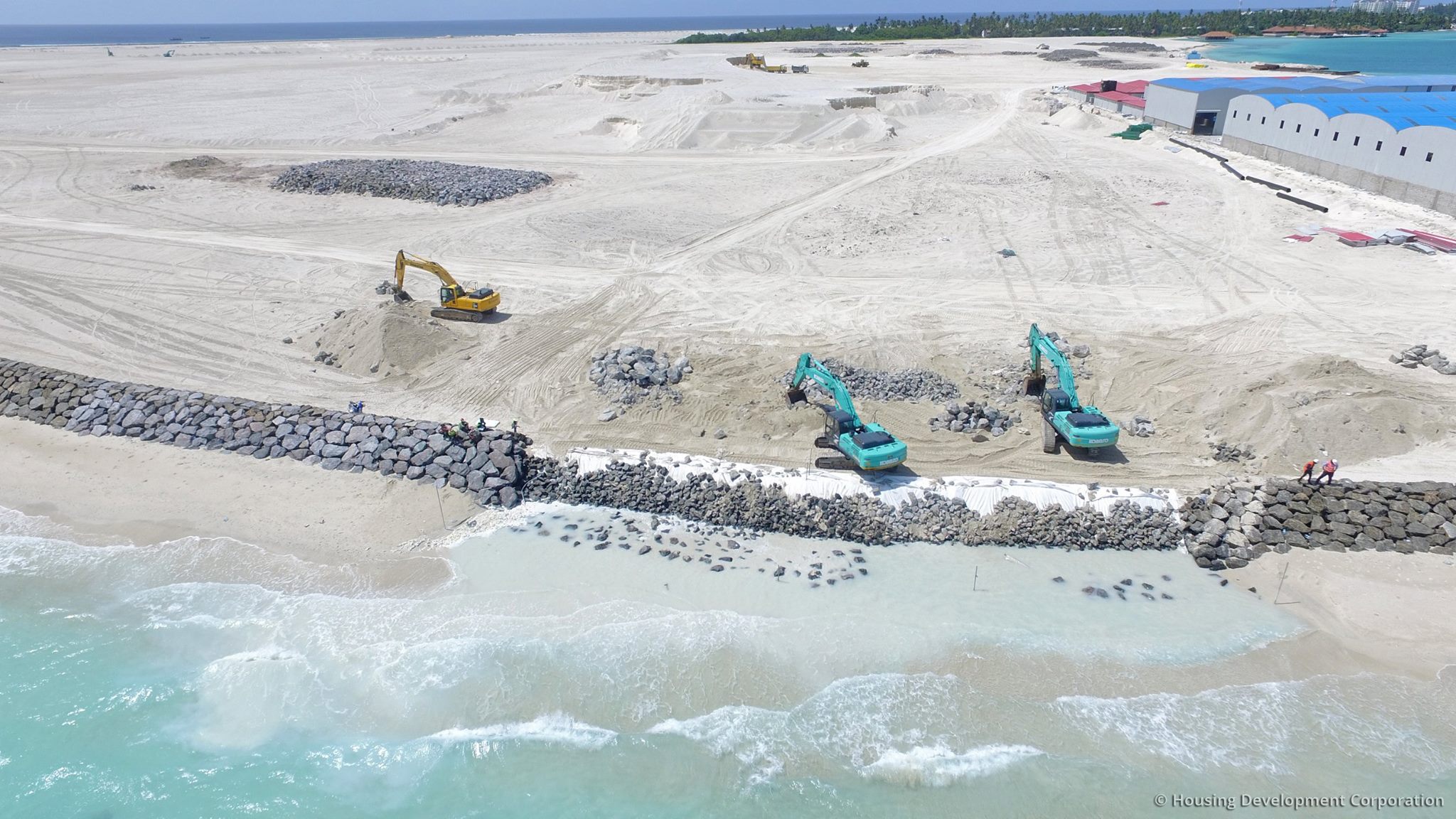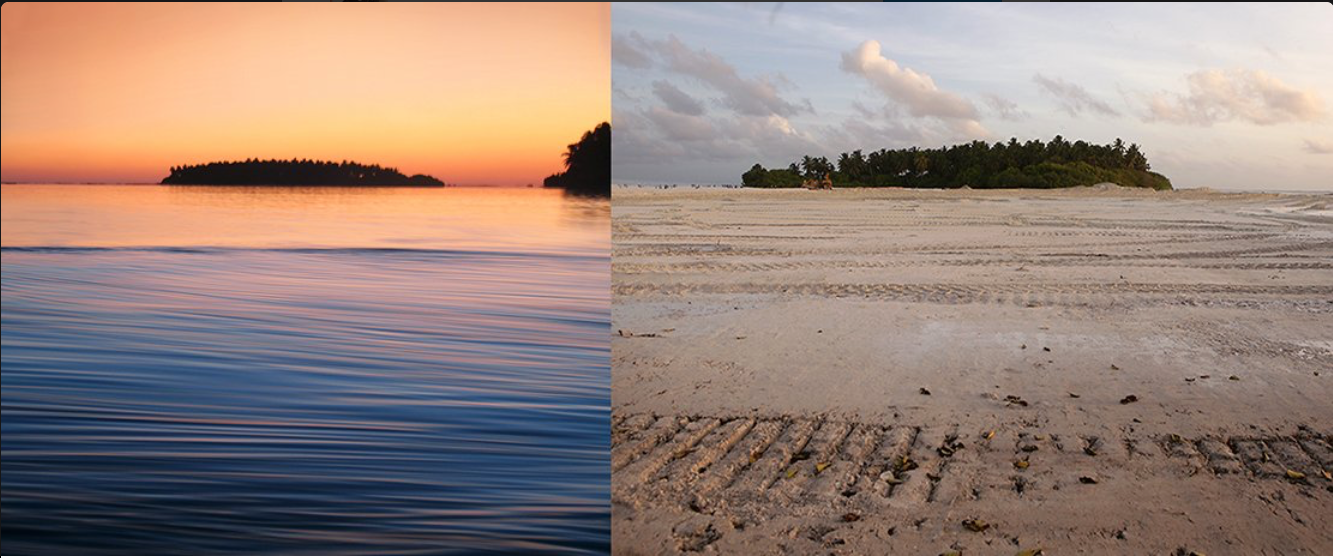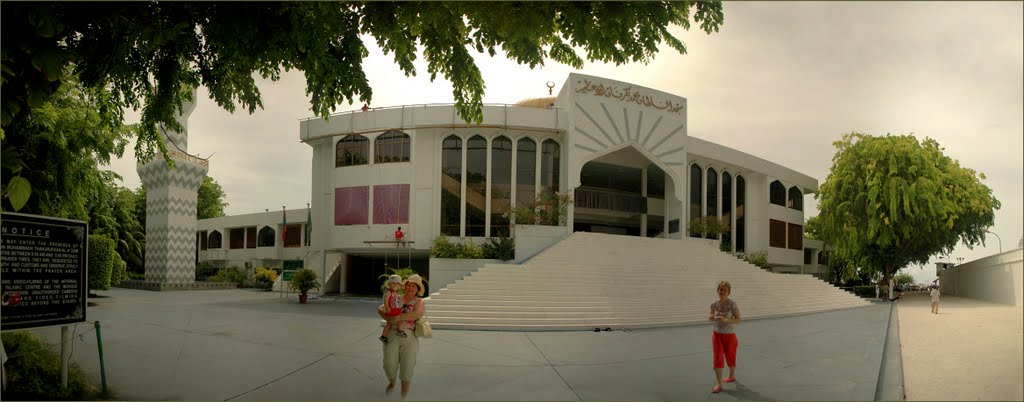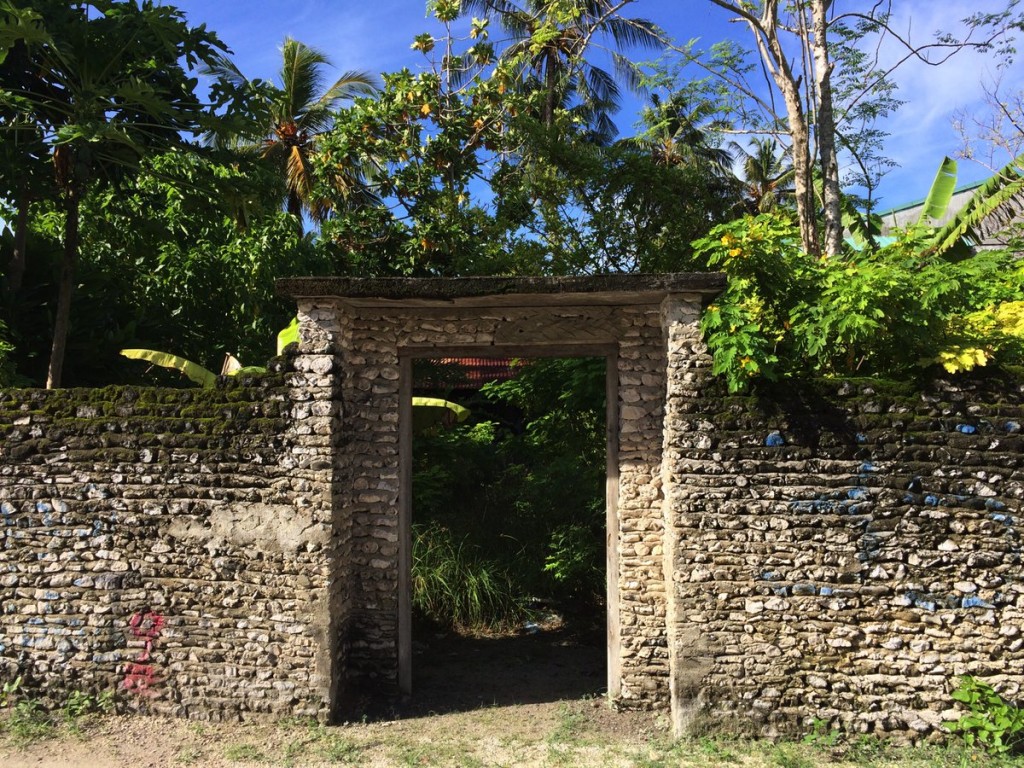Maldives Inc.

by Azra Naseem
We are gathered here today at a time of potential crisis confronting our planet and its population, the crisis of environmental destruction man has invoked upon himself. Man’s action over many centuries have transmuted the natural order of his environment to the point where the whole world is ensnared in the consequences. As the scale of man’s intervention in nature increased, the scope of nature’s repercussions have multiplied. Consequences of the actions of individual nations have reverberated globally, and all mankind’s present and future generations may suffer the penalties for the errors of a few. – President Maumoon Abdul Gayoom, 42nd Session of the UN General Assembly, 19 October 1987
Twenty years on from Gayoom’s landmark speech at the UN, the scale of ‘man’s intervention in nature’ has risen to unprecedented levels in the Maldives. The present and future generations of the Maldives will, without a doubt, suffer what Gayoom described as the ‘errors of the few’, now led by his brother Yameen Abdul Gayoom.
Maldives today is a capitalist dream. Mega development projects that aspire to ‘change the very map of the country’ are underway across the length and breadth of the 1200 islands spread across roughly 90,000 square kilometres of the Indian Ocean. No less than ten dredging projects are ongoing, reclaiming land at the expense of the coral.

Addu 2006/2016 Photo: @ahmedzahid
A bridge is being built to connect Male’ the capital with the island of Hulhule’, home to the country’s main Ibrahim Nasir International Airport. It matters not that the island is only a 10 minute boat ride away, five minutes on a speed boat. Already connected to Hulhule’ is the aritifical island of Hulhumale’, two square kilometres of land dredged from the ocean to alleviate the extreme overcrowding in Male’ which is home to over 150,000 people. Recently, Hulhumale’ has been expanded further to connect it to the island of Farukolhufushi, once a small tourist resort.
There is talk that once the ‘China-Maldives Friendship Bridge’ is completed, the construction of a new bridge may begin, connecting Male’ to Villingili, another ‘suburb’ of Male’ where close to 7000 people live on 0.3 square kilometres, unable to find accommodation on the capital. Together, Male’, Hulhumale’, and Villingili is to become The Greater Male’ Area where at least 70 per cent of the population is to live.
The Nasir Airport will be developed to cater to at least 7 million tourists by 2018, the government has said. Contracts to develop new terminals have been awarded to two state-aligned foreign companies: the Binladin Group of Saudi Arabia and China’s Beijing Urban Construction Group. The Beijing company will build a new 3.2 kilometre runway, a fuel farm, and a cargo complex for which the Maldives government secured a US$373 million concessionary loan from the Chinese EXIM Bank. The Binladin Group, which will build a new passenger terminal for an undisclosed amount, was recently suspended by Saudi Arabia for the Mecca crane disaster.
Meanwhile, the Chinese company building the China-Maldives Friendship Bridge, CCCC Second Harbour Engineering Company for US$210 million, is blacklisted by the World Bank for fraudulent practices elsewhere. Almost all workers on the bridge are Chinese. The north eastern corner of Male’ from where the bridge starts is now occupied by Chinese workers. What was once the most popular recreation area for the people of congested Male’ is now off limits to them, reserved for prefab housing for the Chinese workers who have moved in with entire families. The nearby Artificial Beach has become a popular spot for their leisure, leaving little room for locals who have found themselves crowded out of yet another rare open space.
Where big red ugly platforms for the new bridge now rise from the sea once rose majestic waves, which had earned the area its name: Varunulaa Raalhugan’du – Uninterrupted Waves. Raalhugan’du was a popular surf spot where international award winning surfers rode the waves or spent the day watching them in an area of the beach they cleaned, grew a garden in, and enjoyed the beauty of nature Maldives has to offer. Today surfers get arrested for surfing, protests lead to jail and the government’s promise that it will arrange free transport to alternative surfing spots has turned out to be empty. Waveless and ‘homeless’, the surfers despair of ever getting back their way of life.
RIP second reef pic.twitter.com/2bsAiBDvPK
— kuhthaa (@kuhthaa) May 27, 2016
Over on the western side of Male’, Japanese tetrapods placed around Male’ to protect it from a recurrence of the 1987 tidal waves which caused extensive damages—and triggered Gayoom’s 1987 UN speech—have been removed to make room for a yet another artificial beach. Environmental assessments may have been done, but none were shared with the public. Protests by environmentalists were ignored, as were cautions to verify the area’s safety for swimming given its exposure to the city’s sewage pipes. In May, less than four months after the beach was opened, disaster struck. Monsoon rains swept most of it away into the sea. The project was billed at US$2.5 million. The damage from removal of the tetrapods remains to be seen.
Yet, last week, the government announced construction of a shopping mall and a hotel in the area. Informed observers say the Social Centre—a rare space for community gatherings—and adjacent basket courts, will be demolished to make room for the luxury hotel and mall which a majority of Male’s residents cannot afford. In the centre of Male’ is its only green space, the Sultan Park. It has been blocked off to build, of all things, an ice rink. Trees are being cut down, and historical buildings forming part of its rich heritage have become collateral damage in the pursuit of ‘development’.

Ibrahimee Magu (R) Photo: Lariontsev, Panoramio
Across from the park was the island’s only unpaved road of white sand on one side of which stands the golden domed Islamic Centre. Walking on the short wide street, the white sand softly glowing in the dappled sunlight gently falling through the tall overhanging trees, was a pleasure almost all inhabitants enjoyed. The road is no more. It now belongs to the military HQ next door, the sand removed and replaced with marble, boasting loud, multi-coloured designs raging against aesthetic pleasure.
On the eastern side of Male’, close to artificial beach No.1 is another open space, occasionally used as a venue for open-air music concerts and political rallies, surrounded by little restaurants and cafe’s some of which have sea views. It is soon to be closed off to recreation, to make way for a six storey, 142,716 square feet mosque — a gift from Saudi Arabia which will bear Saudi King Salman’s name. The small island of Male’ already has roughly 20 mosques. Everywhere across the congested capital island are broken pavements, criss-crossed hazardously with long blue plastic pipes that appeared with no rhyme, reason, or explanation.
The development brought by current #Maldives as incessantly parroted by Govt MPs! Male’ – Capital City of #Paradise pic.twitter.com/HrfV9T8g5g — Aishath Aniya (@Aniya_A) June 13, 2016
The island’s drains don’t work. When monsoon rains fall, Male’ is flooded, forcing people to wade in knee-deep water to get anywhere. The water is dirty, home to a million different germs from carelessly thrown rubbish and the endless spitting that is now common culture. Sewerage pipes, laid over 30 years ago, keep bursting at random. Older highrise buildings are not being maintained, giving an indication of what life could be like once all the thousands of planned high-rise apartment blocks are completed in Male’ and Hulhumale’. One of the older buildings, Male’ Hiya, a ten storey building home to hundreds of people, has only one lift which stopped working almost month ago. The sick and the older residents are stuck inside their apartments, unable to leave the building because they cannot get downstairs without a lift. Complaints have fallen on deaf ears; there is no authority to take responsibility.
Male’ Hiya 1;vertical Enslavement.Sick & old age people unabe to move.#FixLift @raajjemv @Mihaarunews @sunbrk @hrcmv @MMuizzu @MaleCity2014
— fazail lutfi (@fazaillutfi) June 15, 2016
As city planning goes, Male’ is a disaster. Yet, plans continue for bigger, taller, shinier buildings. A 25-storey government building, a hospital of the same height and size are in the offing. The two contracts together are worth US$260 million. It is not known who the Malaysian and Singaporean developers will employ on the mega projects. Benefit for locals is not a priority, as other such projects have shown. The rest of Maldives, when not being sold off for resort development, being sectioned off for Special Economic Zones, or signed away for ‘defence and security reasons’ to interested states, is largely neglected.

Abandoned house in Addu. Photo: @SincorrectJ
Abandoned houses have become a part of all inhabited islands’ landscapes. People whose ancestors survived for centuries on the same islands can no longer do so. Living in the globalised modern world means fishing alone is no longer enough for economic survival. Farming is unable to take off given the vast amounts of food imported from abroad. Uninhabited islands that were once leased for farming are no longer accessible to locals – they are reserved for high-end tourism or for other investors from abroad.
Years of neglect has meant most islands are still catching up with basic services such as running water, sewerage systems and proper electricity. Entirely Male’-centric development has deprived people on islands of acceptable standards of education and health. Economic survival, good health, and advancement through education are only possible if people emigrate to the congested capital of Male’. Where neglecting the islands was once the by-product of centralisation, today it has become government policy. To force people to fall in line with the government’s plans for the Greater Male’ Area, the government is actively stopping the provision of services to many islands. They have no choice but to emigrate, to move their entire families to live in squalid high-rise apartments in Male’ and surrounding islands, paying extortionate rents, and become debt-ridden wage slaves who can only dream of enjoying the idyllic lifestyle touted on shiny brochures inviting rich foreigners to Visit Maldives.
The Crisis Doctrine
“Well before the tsunami, the Gayoom government had been trying to persuade its citizens to move a handful of larger, more heavily populated islands that tourists rarely visit. Those islands were supposed to offer better protection from rising waters caused by global warming. But it was difficult even for a repressive regime to uproot tens of thousands of people from their ancestral islands, and the “population consolidation” program was largely unsuccessful.
After the tsunami, Gayoom’s government immediately announced that the disaster proved that many islands were “unsafe and unsuitable for habitation” and launched a far more aggressive relocation program than it had previously attempted, declaring that anyone who wanted state assistance with tsunami recovery would need to move to one of five designated “safe islands”. The entire populations of several islands have already been evacuated and more are in process, conveniently freeing up more land for tourism.” – Naomi Klein, The Shock Doctrine
In her book of the same name Naomi Klein discusses what she calls the Shock Doctrine—when capitalist, often corrupt, governments use America’s ‘free market’ policies to exploit people disorientated by collective shocks suffered in the aftermath of events such as wars, terrorist attacks, or natural disasters to impose ‘economic shock therapy’. The examples she provides include the Bush Administration’s outsourcing of the ‘War on Terror’ to Halliburton and Blackwater; the auctioning off of pristine beaches for tourist resorts in Southeast Asia and Sri Lanka after the tsunami; and the closing down of public housing, hospitals and schools in New Orleans in the wake of Hurricane Katrina.
There has, thankfully, been no major natural disaster to contend with in the Maldives in the years since the 2004 Tsunami. Great shocks of the political kind, however, have been frequent and intense. The past four years after the abrupt end to democratic transition in 2012 and the subsequent authoritarian reversal has been brutal in myriad ways. While people, and opposition political leaders, are occupied with a series of unrelenting crises, the government has been busy selling large parts of the Maldives to any unscrupulous capitalist with a deep enough wallet, be it states or private businesses. While not disaster capitalism per se, it is a version of it that can perhaps be called crisis capitalism.
First, in July 2015, came a major change to the constitution, ending its prohibition of foreign ownership of any part of Maldivian territory. Only 14 out of 84 MPs voted against the change when the amendment was put to vote. Debate within the Majlis was non-existent and no room was given for public discussion before the amendment was brought to Majlis. Among those who agreed with the change were 11 MPs from the main opposition Maldives Democratic Party. Without their vote, the amendment, which required a three-quarters majority—or 64 votes—would have been impossible. President Yameen Abdul Gayoom kept MPs’ pockets lined with money; he admitted to as much.
Much of the bribe money came from millions stolen from the Maldives Marketing and Public Relations Company (MMPRC) led by then Vice President Ahmed Adeeb, the President’s right hand man and lackey under his direct supervision. This money was stolen, and laundered, by selling off or leasing at least 59 islands, lagoons and reefs to various different parties, according to a report by the Audit Office. 53 of these sites had been leased under agreements with the MMPRC, the remaining six were given away without any documentation.
Sale or lease of these islands sites began even before the controversial Constitutional amendment allowing such activity. Available records show the first such transactions date back to November 2013, around the time the Supreme Court awarded the year’s presidential election to Yameen – when the political crisis was at its most intense. Although all the transactions, at least those predating the Constitutional amendment are illegal, and despite the fact that Adeeb has now been found guilty of corruption and is languishing in jail, President Yameen has decreed all agreements will stand, and are to be considered legally binding.
Islands, reefs and lagoons given away for tourism, cordoned off as Special Economic Zones, or awarded to other states for ‘security’ purposes are all off limits to Maldivians. The relationship between the Maldives’ exclusive tourism industry and the ordinary Maldivian has been an uneasy one from the beginning. Locals are not welcome on the resorts which cater to the world’s ‘plutonomy basket’ – the super elite made up of multi-millionaires and billionaires. They come to the Maldives not to mingle with Maldivians and learn about their culture but to forget the very existence of people who do not belong in the same category of superconsumers.
An overwhelming majority of Maldivians are only allowed into the industry at lower level jobs—room boys, cleaners, waiters (if not behind the bar), or as ‘butlers’ wearing ‘traditional Maldivian clothes’ who wait hand and foot on the super-rich. They are cut off from their families, living in dorm rooms, able to see their families only when on annual leave. Most are confined to ‘staff areas’, forbidden to come into contact with the guests, swim in the sea where they can be seen, or use any of the guest facilities. Pay can be better than menial work in other industries, but it is still, of course, much lower than the higher-paying professional jobs which are occupied by mostly foreigners.
Compared to the size and scale of the industry, there is almost no effort made to train Maldivians to occupy its higher echelons—it suits rich resort owners to pretend that Maldives is a country without Maldivians. They spoil the picture in the brochures of the ‘luxurious desert island get away’.
It is in this context that the government’s plans to move people from their islands to the Greater Male’ Area must be seen. Taking away people’s homes, their heritage and their way of life to make way for ‘development’. How can the people of the islands moved into little apartments on the artificial island of Hulhumale’ be what they have been for centuries with no homes with gardens; no coconut trees to live off; no fishing areas to head to off to at sunrise; no vegetation to provide shade and sustenance; no land to grow vegetables in; no boats to call their own; no beautiful beaches near which to congregate? Where would island life go in this small island nation?
And what of its fragile environment? During the same time of political upheaval the Environmental Protection Agency (EPA) was deprived of its independence and coopted into the Tourism Ministry, the very place which the EPA most needs to keep to an eye on. Today, there are reports of environmental damage being caused by tourism industry in various parts of the country. It is left to individuals to highlight such issues on social media, reports which cause only some public outrage and not much else.
Attn: reports of @ShangriLaHotels #Maldives destroying environment of #Addu atoll @ecocare_mv @EpaMaldives @EnvGovMv pic.twitter.com/KS2CRyEltm
— Muna Mohamed (@munamohamed) June 15, 2016
Added to this is the continuing damage from the mega projects the government has undertaken with no environmental risk assessments: the China-Maldives Friendship Bridge; the endless Hulhumale’ dredging; the second artificial beach in Male’; the ice-rink in Sultan Park; the many high-rise buildings planned for Male’; and, of course, the planned migration of two thirds of the population to the Greater Male’ Area. Many incidents have taken place during these projects already in motion that demonstrate little attention is being paid to the environmental damage they cause.
#Maldives env. crimes: Chinese bridge Contractors dump construction material [for storage] on Gulhi Falhu reef. pic.twitter.com/wUwvWNyiJB — Mohamed Junayd (@mjunayd) June 5, 2016
Fact is, the very existence of Maldives is at risk; and very few are paying attention. President Yameen is determined to continue his presidency after the current term ends in 2018. His campaign is already in full-swing, backed by rich states (Saudi Arabia) and powerful states (China) for whom the environment and Maldivian way of life is of little consequence.
At the moment the push is on to save Yameen from a primary within his own party, PPM, to win the 2018 presidential ticket. Seemingly, he has received an’ A-Report’ for his performance so far. What has he done that is so good, and why is he to be given the presidential ticket on a plate? ‘Development’, apparently – mostly the very actions that has put the country’s existence at risk.
Primary Akaa Nulaa 2018 RIyaasee TKT Raees Yamin ah Liben jeheny mihenve! pic.twitter.com/tVaqw6L1D2
— Ahmed Nihan (@ahmed_nihan) June 18, 2016

Never mind what price we pay for any of it.
Naomi Klein finds something to be positive about the destruction of this planet brought about by greedy capitalist leaders across the world, like Yameen.
I am convinced that climate change represents a historic opportunity on an even greater scale. As part of the project of getting our emissions down to the levels many scientists recommend, we once again have the chance to advance policies that dramatically improve lives, close the gap between rich and poor, create huge numbers of good jobs, and reinvigorate democracy from the ground up…But before any of these changes can happen…we first have to stop looking away.
The Maldives should take this message to heart. The country’s environment is exceptionally fragile, it is unsuited to such rapid and unsustainable development. Mega projects such as those currently under way threaten both the environment and the Maldivian way of life.
People need to stop looking away, and unite against this destruction, and the threat it represents. It can be the catalyst for delivering ‘a People’s Shock, a blow from below. It can disperse power into the hands of the many rather than consolidating it in the hands of the few…’ It can be the cause around which to unite and revive the Maldives’ democracy.
Additional Resources:
Falhu Ali Ran Muy, forthcoming book (Dhivehi) on geography, demography, economic history & consequences of development induced displacement & forced migration in Maldives, by Muna Mohamed
Rajjetherey Meehunge Party @Rajjethere
One comment